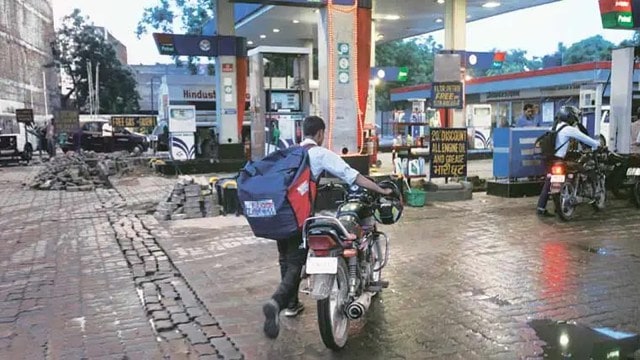Poor work culture taking a toll on mental health of 99% cab, drivers, delivery staff in India: Survey
The survey conducted in 8 Indian cities by Paigam in collaboration with the Indian Federation of App-based Transport found that a large chunk of workers work beyond 10 hours a day and earn below Rs 15,000 a month.
 It surveyed over 10,000 respondents across eight major cities – Delhi, Lucknow, Jaipur, Indore, Mumbai, Kolkata, Hyderabad, and Bangalore – and was released on March 11. (Representational Photo)
It surveyed over 10,000 respondents across eight major cities – Delhi, Lucknow, Jaipur, Indore, Mumbai, Kolkata, Hyderabad, and Bangalore – and was released on March 11. (Representational Photo)Written by Ananya Shukla
Harsh work-related challenges faced by gig workers, across eight major cities in India, are taking a toll on their health with an alarming 99.3 per cent of cab drivers and 98.5 per cent of delivery personnel experiencing anxiety, stress, and chronic pain due to their unscientific work culture, according to a recent survey report.
The survey, conducted by the People’s Association in Grassroots Action and Movement (Paigam) in collaboration with the Indian Federation of App based Transport, found that a large chunk of the workers work beyond 10 hours a day and earn below Rs 15,000 a month, while nearly half of the cab drivers (47.1%) and over 41% of delivery personnel reported experiencing violence at work.
The long hours, coupled with the stress of navigating traffic and meeting tight deadlines, have a significant impact on physical health, said the report, titled ‘Prisoners On Wheels? Report on Working and Living Conditions of App-based Workers in India’.
It surveyed over 10,000 respondents across eight major cities – Delhi, Lucknow, Jaipur, Indore, Mumbai, Kolkata, Hyderabad, and Bangalore – and was released on March 11.
The objective of the report is to draw attention to the working, living conditions and economic, social, mental and health-related aspects of app-based cab drivers and delivery persons across India, Paigam said.
The report has found that 31 per cent of cab drivers and 78 per cent of delivery persons work beyond 10 hours a day, with a significant portion exceeding 14 hours daily. It also found that 63 per cent of SC/ST drivers worked for over 14 hours a day compared to only 16 per cent of general drivers.
Despite the long hours, a large percentage of gig workers struggle to make both ends meet, with 43 per cent of cab drivers earning below Rs 15,000 and 34 per cent of delivery persons earning below Rs 10,000 per month.
“This report represents the largest survey ever conducted in the world on app-based cab drivers and delivery persons in the app-based economy of India, with a sample size exceeding 10,000 workers,” Paigam said on social media.
The survey involved over 50 questions about the working and living conditions of gig and platform workers and also included face-to-face surveys, screen-shot data, and focused group discussions.
Further, a significant number of respondents faced the threat of arbitrary account suspension or ‘ID blocking’. Over 80 per cent of both groups reported being negatively impacted by this practice, with nearly half of cab drivers feeling extremely affected.
Nearly half of both groups of workers (41% for cab drivers and 48% for delivery personnel) are denied even a single day off each week.
This lack of work-life balance translates into limited time spent with family (67% for cab drivers and 65% for delivery personnel). Vacation time is a luxury very few can afford – nearly half of cab drivers and delivery persons reported having no vacation time at all.
The report also highlights widespread dissatisfaction with current fare structures. An overwhelming majority – 80% of cab drivers and 73% of delivery personnel – expressed unhappiness with their earnings. Compounding this issue are high commission rates and unexplained deductions.
Over a third of cab drivers reported deductions of 31-40 per cent per ride, while a staggering 68 per cent of delivery personnel faced arbitrary deductions from their earnings.
The survey underscores the urgent need for industry stakeholders, policymakers, and companies to address issues related to working conditions, earnings, and overall well-being of gig workers. Efforts towards ensuring fair wages, job security, and access to mental health support are imperative for fostering a sustainable and equitable gig economy ecosystem in India, the report states.












